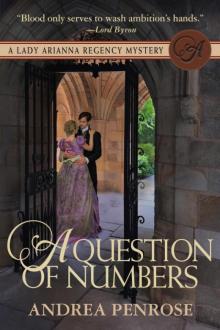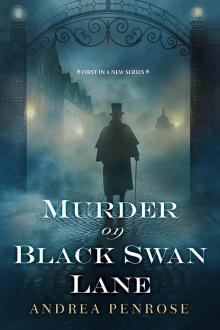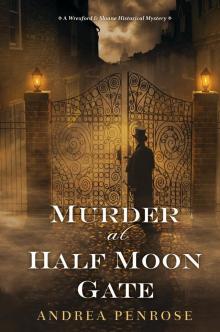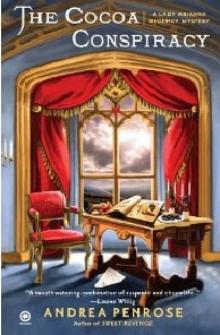- Home
- Andrea Penrose
Murder on Black Swan Lane
Murder on Black Swan Lane Read online
MURDER ON BLACK SWAN LANE
Andrea
Penrose
KENSINGTON BOOKS
http://www.kensingtonbooks.com
All copyrighted material within is Attributor Protected.
Table of Contents
Title Page
Copyright Page
Dedication
ACKNOWLEDGMENTS
PROLOGUE
CHAPTER 1
CHAPTER 2
CHAPTER 3
CHAPTER 4
CHAPTER 5
CHAPTER 6
CHAPTER 7
CHAPTER 8
CHAPTER 9
CHAPTER 10
CHAPTER 11
CHAPTER 12
CHAPTER 13
CHAPTER 14
CHAPTER 15
CHAPTER 16
CHAPTER 17
CHAPTER 18
CHAPTER 19
CHAPTER 20
CHAPTER 21
CHAPTER 22
CHAPTER 23
CHAPTER 24
CHAPTER 25
CHAPTER 26
CHAPTER 27
AUTHOR’S NOTE
KENSINGTON BOOKS are published by
Kensington Publishing Corp.
119 West 40th Street
New York, NY 10018
Copyright © 2017 by Andrea DaRif
All rights reserved. No part of this book may be reproduced in any form or by any means without the prior written consent of the Publisher, excepting brief quotes used in reviews.
Library of Congress Card Catalogue Number: 2017933185
Kensington and the K logo Reg. U.S. Pat. & TM Off.
ISBN: 978-1-4967-1077-2
First Kensington Hardcover Edition: July 2017
eISBN-13: 978-1-4967-1078-9
eISBN-10: 1-4967-1078-9
First Kensington Electronic Edition: July 2017
To Saybrook College
“A company of scholars, a society of friends.”
Thank you for inspiring a love of learning and a lifetime of intellectual curiosity.
Lux et Veritas
ACKNOWLEDGMENTS
I’m profoundly grateful to all those who have helped me take the idea for Murder on Black Swan Lane and shape it into a finished book. First and foremost, thanks go to my agent, Gail Fortune, and my editor, Wendy McCurdy. No author could have more delightfully wonderful people with whom to work.
Special hugs also go to my fellow Word Wenches—Joanna Bourne, Nicola Cornick, Anne Gracie, Susanna Kearsley, Susan King, Mary Jo Putney and Patricia Rice—who are all fabulous writers and lovers of history. They helped unravel many a plot kink when I’d tied myself in knots . . . not to speak of always being there with cyber chocolate and chardonnay whenever I started whining to them in the dead of night.
As for the science in the book, to loosely paraphrase Sir Isaac Newton: If I have seen beyond my normal scope of knowledge it is by standing on the shoulders of giants. In my case, that “giant” is John R. Ettinger, whose masterful knowledge of chemistry, physics, and mathematics was instrumental in helping me comprehend the nuances of alchemy and the birth of modern science. (If there are any errors, the fault lies entirely with my feeble brain!)
And a big shout-out to my dear friends and writer pals who served as beta readers and so generously gave invaluable feedback as I poked and prodded the manuscript into its final form. Lauren Willig, Deanna Raybourn, Patrick Pinnell, Amanda McCabe . . . you guys are the best.
“History is the Devil’s Scripture.”
—Lord Byron
PROLOGUE
A flicker of weak light skittered over the stone floor, followed by the soft scrape of steps and the whispered whoosh, whoosh of mist-dampened wool. Quickening his pace, a lone man moved down the nave’s aisle, the shoulder capes of his greatcoat fluttering darkly against the shroud of shadows.
At the transept, he paused and angled the iron lantern at a row of close-set granite pillars guarding the apse.
A figure slipped out from the slivered gloom. “You’re bloody late.”
“What I have to show you will be worth the wait. You asked me for proof—well, prepare yourself, my dear Golden One.” In deference to the sepulchral silence of the deserted church, the man pitched his words to a low murmur. Which was, he mused, a pity, for his mellifluous voice could set the surrounding stone to resonating with a magnificent echo.
And if ever a pronouncement deserved a choir of angels . . .
“Yes, prepare yourself for a most wondrous revelation.” A ghostly puff of vapor hung for an instant in the chill air as he withdrew a small leather-bound book from his coat pocket and held it out.
His companion hesitated. The slits in his black-as-Hades mask betrayed a flutter of movement as a wink of light gilded the downturned lashes.
Dear heavens, such silly histrionics, when here they stood on the brink of immortality.
Golden One eyed the frayed edges, age-blackened calfskin, and faint remains of the gilt-stamped title a moment longer before looking up. “You promised the manuscript—”
“This codex is the first key to unlocking the manuscript’s secret. Call it a petit goût, if you will,” explained the man smoothly. “A small taste to tease the appetite, to delight the mouth, as the French would say.” He curled a small smile. “Though this is from the mountains of Bavaria. The Germans don’t appreciate the art of living well, but they are awfully good at puzzling out conundrums.”
With a muttered oath, Golden One shifted his stance and loosened the fastenings of his voluminous cloak.
It was, noted the man, of far finer quality and cut than the fellow’s usual garments. Perhaps the prospect of coming riches—
“Save your little snippets of sophistication to impress your fancy friends,” growled Golden One as he took the book and slowly cracked open the spine. “I know naught and care naught of France and the German principalities. My province is the natural world, which knows no borders, no boundaries.”
Dust motes flew up, dancing like whirling dervishes through the narrow beam of lantern light. In contrast, the cavernous darkness looming all around was still as a crypt.
“Careful,” chided the man, though he noted that for someone who toiled with his hands, the fellow had surprisingly smooth and well-tended fingers. “You are holding delicate parchment and pen strokes that will soon change the world.”
“Assuming what you have read is . . . true.”
“I have compelling reason to believe it is,” replied the man. “Sir Isaac Newton’s manuscript—”
“Newton was wrong. About a great many things.”
“That is because he lacked the key documents that would have given him the knowledge he was missing. I have them, and the transformative secret is at our fingertips! It needs only a man of your unique talents to bring it to fruition.”
Golden One turned through the pages, stopping occasionally to study the hand-drawn illustrations and scrutinize the spidery text.
“Satisfied?”
“No.” The covers snapped shut. “This tells me nothing. I need to see Newton’s manuscript and the other books before I fully commit to being part of your fanciful scheme.”
The man felt a stab of anger at the unexpected reply. “I’ve already paid you a great deal of money.”
A shrug. “And I’ve already done a great deal of work. Whether I do more is up to you.”
“How can you hesitate? This opportunity is a gift from God!”
“So you say. But I am a pragmatist, who takes a more earthly, empirical view of things. You promised proof of your claim, and I have yet to see it.”
“The other books are too precious to carry around,” he protested.
“I have them hidden where they are safe.”
“I’m not about to risk my present chances of advancement without more than your heavenly promises of fortune and fame,” countered Golden One.
A strained silence stretched out for several heartbeats.
He would have preferred to win the fellow over with persuasion, but he wasn’t averse to using force. It was, after all, for the Higher Good.
“Advancement?” repeated the man slowly. “Your chances of advancement would be virtually nil were I to inform certain people of your little secret.”
Silence.
“You think I haven’t learned your real identity?” A smile. “Surely you must sense by now that God has granted me special powers.”
“Is that a threat?” asked Golden One softly.
“Simply a warning,” he replied. “But come, let us not quarrel over theoretical conflicts. The truth is, you will soon be rich beyond your wildest dreams.”
“What you ask is dangerous.”
“Ah, but to reach out and grasp the immortal beauty of genius requires taking a leap of faith.” A pause. “Just think of it—you will effect not just a worldly transformation but also a spiritual one as well.” He couldn’t keep his voice from rising a notch. How could the fellow not appreciate the sublime wonder of what he was being offered? “The risk is well worth the reward.”
“I . . .” Golden One shot a nervous look at the far end of the transept. “Did you hear something?”
“No.” The man cocked an ear.
Nothing.
“I assure you, there’s no one else here at this hour. The watchman won’t make his rounds for another hour.”
“I tell you, I saw a flutter of movement.”
He looked around, probing the darkness for several long moments before shaking his head. The fellow was seeing specters. Such a volatile imagination would have to be carefully controlled.
“There’s nothing—”
As he turned back, a splash of liquid, burning hot as the fires of hell, hit his face. “G-God Almighty!”
“Yes, say a prayer,” said Golden One softly as he quickly pocketed the book and drew a carving knife from beneath his cloak.
“Heavenly Father, I beseech you . . .” Clawing at his blinded eyes, the man fell to his knees, the rest of his words spiraling into a piercing scream.
CHAPTER 1
A plume of steam rose from the bubbling crucible, the curl of silvery vapor floating ghost-like against the shadowed wood paneling before dissolving into the darkness. After consulting his pocket watch, the Earl of Wrexford scribbled a few more notations in his ledger, the scratch of his pen punctuated by the soft pop, pop, pop of colorless chemicals.
“The Devil’s brew,” he murmured, leaning back in his desk chair and staring at the brightly colored satirical print propped up against a stack of books. “Though I give the artist credit for coming up with a far more poetic phrase.”
Satan’s Syllabub. Pitchforks had been drawn in to replace the two l’s of the print’s red-lettered title. As for the caricature of him . . .
A mirthless laugh slipped from his lips.
A pair of scarlet horns poked out from the tangle of long black hair. “I must remember to visit my barber this week,” he murmured, brushing a strand of the shoulder-length locks from his collar. “And is my nose really that beaky? I have always thought it rather elegantly aquiline.”
Shifting his gaze lower, he saw that the artist had drawn him without his trousers on and that his bare hairy legs—a gross exaggeration—ended in cloven hooves. The fine print of the caption explained that he was in the habit of concocting his noxious brews right after enjoying an amorous interlude with his latest conquest.
“Lies,” muttered Wrexford wryly, taking a moment to eye the clever caricature of a near-naked lady peeking out from the large copper crucible cradled between his knees. The deft pen strokes had captured Diana Fairfield’s petulant pout with frightening accuracy.
Yes, the face was perfect, but the implied timing was all wrong.
“I never mix business with pleasure.” For one thing, performing chemical experiments in the nude could have very painful consequences.
But then, he supposed the artist couldn’t be blamed for taking poetic license. A. J. Quill had earned a reputation for creating London’s most scathing satirical prints, and no doubt earned a pretty penny for his merciless skewering of those caught up in the latest Society scandal.
Be damned with truth. Ruthless images, cutting commentary—that was what the paying public wanted. Misery loved company, especially when the sufferer was one of the Privileged Few.
“Ah, I see you’ve found today’s delivery from Fores’s print shop.” The door to the workroom closed quietly behind Tyler, the earl’s valet and occasional laboratory assistant, as he carried a tray of chemicals to the small worktable by the spirit lamp.
“Yes. And this latest one is really quite upsetting.” Wrexford glanced back at his timepiece and waited ten more seconds before turning off the flame. “Quill has made my legs look awfully spindly, and you know how vain I am about my shapely calves.”
“It’s gone beyond a jesting matter, milord.”
A gentleman’s gentleman would not ordinarily dare to rebuke his master. But Tyler was no ordinary valet, reflected the earl. To begin with, he didn’t swoon over the task of removing foul-smelling stains and singe marks from a finely tailored evening coat. More importantly, his scientific education made him far more useful in other matters.
Tyler cleared his throat with a brusque cough—never a good sign. It meant a lecture was coming, a blunt one, delivered in a rough-cut Scottish brogue. “Perhaps you ought to consider ignoring Reverend Holworthy’s attacks from now on. Engaging in a public war of words isn’t doing your reputation any good.”
Wrexford picked up the half-empty glass of brandy by his inkwell and drained it in one prolonged swallow.
He hadn’t initiated the hostilities. The first salvo had been fired off several weeks ago when the Reverend Josiah Holworthy, a clergyman of rising oratorical note, had preached an emotional Sunday sermon decrying the corruptive influences of dissolute debauchery on a civilized society. Holworthy had used the earl as an example of Wickedness Personified, describing his recent behavior in lurid detail.
Wrexford knew restraint would have been the wiser course of action, and had the man’s rhetoric been halfway clever, he would have let sleeping dogs lie. But the attack had been crude and so he couldn’t resist sending a rebuttal to the editor of the Morning Gazette.
It had been published in the newspaper the following morning, and from there, the trading of insults had escalated, much to the glee of the rest of London.
A miscalculation. He wasn’t as careful in his personal life as he was with his scientific experiments. Holding his empty glass up to the Argand lamp, Wrexford watched the shards of light refract off the cut crystal for several long moments before replying.
“Since when have you known me to care about my reputation?”
His valet carefully rearranged the chemical vials into two neat rows before fetching one of the decanters on the sideboard and crossing the carpet to pour out a fresh measure of brandy.
Or perhaps it was hemlock. Of late, his mercurial moods had no doubt made him an awfully difficult fellow to deal with.
“It’s just as well, I suppose,” intoned Tyler. “For if that sanctimonious, self-anointed saint keeps attacking you as the Devil Incarnate, and you keep stirring the flames to a hotter burn with your outrageous comments on Society’s narrow-minded morality, the only reputation you’ll have will be black as sin.”
“But it’s so amusing to stick one of those clever French self-igniting matches up his pompous arse,” muttered Wrexford, “and watch smoke come out his ears.”
“Playing with fire is dangerous, milord.”
He expelled a sigh. “He called me a witch.”
“And you promptly corrected him,” said Tyler,
“pointing out that ‘witch’ refers to a female and he should properly refer to you as a warlock.”
“I was right,” retorted the earl. “The man is a bloody idiot.”
“I believe what you called him in print was an illiterate widgeon, whose brain could fit twice over on the head of a pin.”
“Ye god, can you blame me? All that blather about how my soul needs to be transmuted to a higher plane—”
Tyler cleared his throat to cover a snicker.
“Remind me again why I keep you in my employ,” grumbled Wrexford. “Aside from your obsequious respect for my exalted person.”
“I have concocted a polish for your boots that outshines Beau Brummel’s secret recipe,” replied Tyler.
“Dare I hope that you will tell me what’s in it before I toss your insolent arse into the street?”
“Eye of newt, frog sweat—”
The earl let out a bark of laughter. The fact that Tyler didn’t take his ill-tempered caustic comments to heart was also a mark in his favor.
“Pray tell, what is the point of all your chidings?” When his valet didn’t answer right away, Wrexford pressed, “You think I should take steps to end this debate?”
Tyler shrugged. “It might be wise. Things appear to be on the verge of getting out of control.”
“I shall consider it.” Wrexford rose and stretched. Keeping precise control of the liquid’s temperature and timing the addition of each ingredient had left him feeling fidgety. The conversation hadn’t helped. Tyler was right—baiting a religious fanatic had been a bad decision.
Only one of many he had made in recent weeks.
But Wrexford pushed such musings aside for now. “There’s no need for any further work here this evening. The liquid must cool completely, so we will wait until morning to continue with the experiment.”

 A Question of Numbers
A Question of Numbers Murder at Queen's Landing
Murder at Queen's Landing Murder on Black Swan Lane
Murder on Black Swan Lane Sweet Revenge
Sweet Revenge The Cocoa Conspiracy
The Cocoa Conspiracy Smoke & Lies
Smoke & Lies Murder at Half Moon Gate
Murder at Half Moon Gate The Stolen Letters
The Stolen Letters Sweet Revenge lahm-1
Sweet Revenge lahm-1 The Cocoa Conspiracy lahm-2
The Cocoa Conspiracy lahm-2